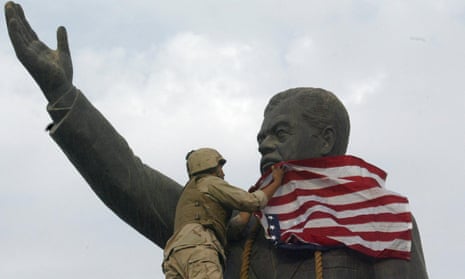Despite the hyperbole and drama that surrounded the US presidential race, it is my opinion that President-elect Donald Trump’s foreign policy is one of much-needed hope and optimism (Trump: ‘We will stop racing to topple foreign regimes’, theguardian.com, 7 December). The notion of the US acting as the world’s police has got out of hand. With troops stationed in countries across the world, and military spending totalling more than the next 16 countries’ combined, the overreach of the US military is staggering, and yielding terrible results. It doesn’t take much research beyond the mainstream media to realise the intervention in Libya was a disaster, bringing massive destabilisation to the region and creating a power vacuum for terrorist groups like Isis. The Iraq war was predicated on bad intelligence and the false claim that there were weapons of mass destruction under Saddam Hussein. The sheer recklessness of such interventionist policies has resulted in massive loss of life and destabilisation.
In 2008, Americans were sold by anti-war promises of Barack Obama. Instead, they merely saw the continuation of establishment interventionist policies of past administrations. Grassroots support for a non-interventionist policy and the end to irresponsible and misguided regime change in other countries was evident in the Tea Party movement and Congressman Ron Paul’s presidential runs. Finally, in Donald Trump, these voices have been recognised and voted into the White House.
Detractors will be quick to call Mr Trump’s policies reckless and primitive. But non-interventionism is not isolationism and, despite the mainstream media pushing a narrative that suggests otherwise, Mr Trump’s positions on foreign policy have been clear and consistent far before his foray into politics. With an ever increasing national debt of almost $20tn, and a status quo foreign policy that has time and again failed, it is time for Americans to be open to real change from outside of the establishment.
Clive Ng
Hong Kong
Would it not have been discourteous if President-elect Trump had failed to respond to a congratulatory call from the elected president of Taiwan (Report, 6 December)? Those who disagree should bear in mind that Taiwan’s president came to power after a democratic election and, unlike mainland China, is not occupying another country (Tibet), is not building up an aggressive military force in the South China Sea, allows press freedom and religious freedom, and generally respects human rights.
John Wainwright
Potters Bar, Hertfordshire
US trade unions were promised hundreds of thousands of jobs to gain their support for Nafta. But, according to the Economic Policy Institute’s study of Nafta’s first 12 years, it caused the net loss of over 1m US jobs and a significant decline in the value of wages for millions more workers. So by “striking down” Nafta, but clearly dependent on creating replacement jobs (No country with a McDonald’s can remain a democracy, George Monbiot, 7 December), Trump could repay one risk his voters took.
David Murray
Wallington, Surrey
Join the debate – email guardian.letters@theguardian.com
